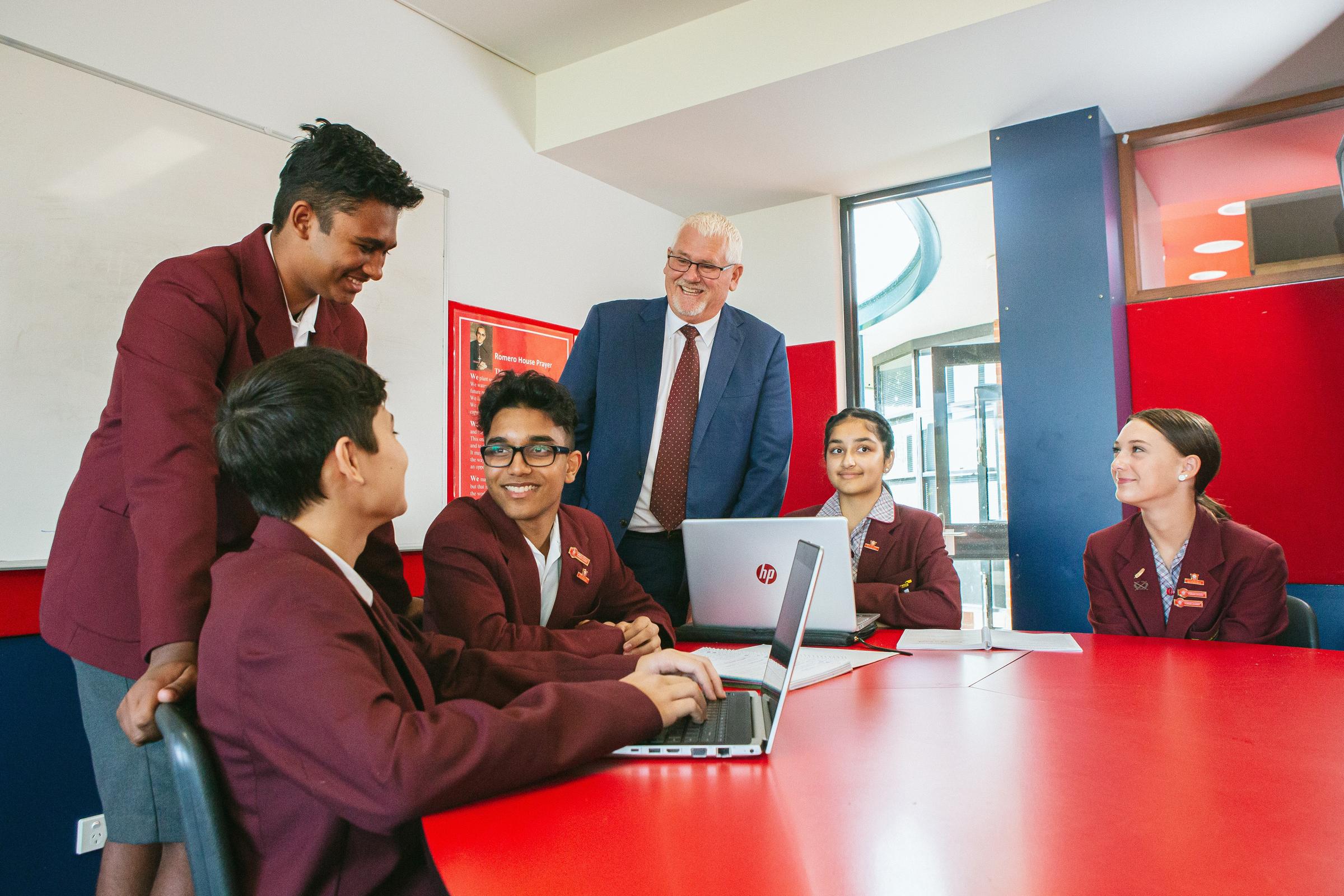Learning & Teaching News

Academic Assembly Awards
Following a tumultuous few years with lockdowns, learning from home, and changes to the study designs, we are exceptionally pleased to see the overall growth of our senior student results trending upwards. A significant note of thanks needs to be extended towards the St. Peter’s College staff for their hard work and expertise, and also to the parents and caregivers of our graduates for their support and dedication to their child’s academic development.
On Tuesday, 7 February, we gathered as a school community to recognise and celebrate the success of our 2022 VCE and VCAL high achievers. In attendance with their families and the College community, our 2022 graduates received awards reflecting their outstanding efforts in a variety of subject areas, allowing all students to both acknowledge and be inspired by their predecessors.
Awards were given for students who received a study score of 40 or above, the subject dux of each subject across both campuses and for students who received an ATAR above 90.
2022 College Dux
The 2022 College Dux for St. Peter’s College was Thamadee Dela with an ATAR of 97.9.
Her subject scores included:
Further Maths – 50
Biology – 44
Chemistry – 40
English – 38
Legal Studies – 37
Mathematical Methods (2021) - 35
Thamadee spoke to the College community at the Awards Assembly and explained that her exceptional result was due to two main factors. At the start of the year, she set herself a specific goal and this helped to keep herself focused and motivated. Even though by Term 4 she felt tired and struggled to maintain the earlier levels of commitment, the excellent work that she had put in during Terms 1 to 3 had set a solid base for her to launch into the exam period. The second factor that Thamadee cited as helping her to achieve this result was the feedback from teachers. She was appreciative of all her teachers and said that making themselves available to her made all the difference.
Thamadee has her sights set on an Engineering Degree at Monash University this year and is interested in Chemical Engineering in particular. We congratulate Thamadee and wish her all the best as she moves on from St Peter’s and into this next exciting part of her journey.
A Special Welcome to Our New Year 7 Maths Students
We are very excited to continue the great developments in our Maths department. Traditionally in schools, it has been extremely difficult for one teacher to cater to the learning needs of 20 individual students. As a result, not every student has experienced success in maths, with many students finding it particularly stressful or difficult. Our teaching team is now working very hard to change that, by evolving the way we teach maths so that instead of all students learning the same topic at the same time, each student will focus on only what they are ready to learn. This means that every student can experience success in maths.
Our teaching team is working with evidence-based, data-informed strategies that help to target the specific learning needs of each child. They can expect to see a few things in their new classroom that might be a bit different from their previous maths experience:
- Class-wide rich learning tasks that aim to get your child excited and engaged in problem-solving using the maths skills they’ve developed, alongside their friends.
- Tailored mini-lessons rotated through smaller groups of students. Teachers can focus on specific mathematical topics with smaller groups of students who will benefit most from that lesson.
- Your child will receive maths that they’re ready for. Each student will have their own maths program tailored to what they’re ready to work on next while working with their teacher to figure out how they can continue to develop their learning skills. That includes regular check-in tests and goal setting to figure out what your child wants to achieve next - and how they can achieve their goals.
- One-on-one teacher support and feedback. When students are stuck on a particular piece of maths, their teacher will help them out as needed.
In the meantime, we encourage you to chat with your child about what it means to have a growth mindset
If you would like to do a little more reading on the ways you can help your child achieve their true potential in the maths classroom, please click on any of the links below:
Parents’ Beliefs about Math Change Their Children’s Achievement - YouCubed
Why saying “I’m not good at maths” is just not good enough!
How you can be good at math, and other surprising facts about learning | Jo Boaler | TEDxStanford
Tips for Getting a Good Start in High School
- Set your intentions This comes in the form of ‘iSMART goals’ in your Tutor Groups or Pastoral Care period. Copy these goals onto your SPACE ePortfolios to reflect on throughout the year.
- Get organised! Set up a comfortable study space at home. Make a weekly plan, including your timetable, and set aside room for leisure time, extra-curricular activities and revision goals for each of your school subjects. Stick it above your desk, and share it with your parents/caregivers so they can help to support you.
- Ask questions in class. If you don’t understand something in class, don’t sit quietly hoping you can work it out later. Be confident, put your hand up and ask. Chances are there will be at least one other person in the room who doesn’t get it either. Teachers love it when students ask for clarification. And they’re really good at explaining things in different ways. They would much rather go over something again in class than have you stressing over it! Learning is like building a brick wall - if you miss a brick at the bottom, you will miss two in the space above it, then three in the space above that and very soon, you have a massive gap in your learning. Do everything you can to help yourself understand a concept - ask a friend, ask your teacher, research, and ask your parents.
- Train yourself to find answers on your own. On the Internet, you can find the answer to any question almost immediately. But the idea of school is to teach you to think for yourself and resolve problems. Try not to always go for a ready-made solution, but to think about finding a solution yourself.
- Turn off your mobile phone while you’re completing homework. You were born into a “connected” generation. You can immediately Google the answer to any question that comes to mind. This is a good idea, but it can be damaging to your concentration levels (yes, really!). The golden rule is, during your working time turn off your mobile phone, or keep it as far away as possible from your workstation, so that you avoid temptation.
- Be strategic about work and play. If you’re going to dinner and a movie with friends on Saturday night, reserve 1-4 pm for studying. You’ll have the incentive to concentrate while you’re working, and afterwards will be able to go out without worrying about work.
- Schedule breaks. Give yourself a break every half hour when you’re working, but don’t do something you could get pulled into, like checking email or talking on the phone. Do something physical — go for a walk, or make the bed, or get a snack — but something over which you have control.
- Take care of yourself. Experts confirm that health and education are directly related. When students are strong and healthy, they can concentrate better in class. Eat nutritious foods, get sufficient exercise, and ensure you are getting adequate sleep. Take care of your mind as well as your body. If you find that you are struggling emotionally or you are unable to cope, reach out to others for help. Seeking help is a sign of strength. Talk with someone you trust, like a friend, a teacher, a member of your family, or a school councillor. You can even find some help online with organisations like Headspace, or you can make a call to the KidsHelpline on 1800 551 800.
Adapted from EnkoEducation, 2017; Ruth Lee, MEd,ET/P via Child Mind Institute, 2022; Headspace.org.au 2023
David Hansen
Deputy Principal - Learning & Teaching


